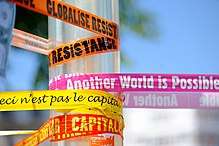Alter-globalization
Alter-globalization (also known as alternative globalization or alter-mundialization—from the French alter-mondialisation—and overlapping with the global justice movement) is a social movement whose proponents support global cooperation and interaction, but oppose what they describe as the negative effects of economic globalization, considering it to often work to the detriment of, or not adequately promote, human values such as environmental and climate protection, economic justice, labor protection, protection of indigenous cultures, peace and civil liberties.

The name may have been derived from a popular slogan of the movement, namely "Another world is possible", which came out of the World Social Forum.[1] The alter-globalization movement is a cooperative movement designed to "protest the direction and perceived negative economic, political, social, cultural and ecological consequences of neoliberal globalization".[2] Many alter-globalists seek to avoid the "disestablishment of local economies and disastrous humanitarian consequences". Most members of this movement shun the label "anti-globalization" as pejorative and incorrect since they actively support human activity on a global scale and do not oppose economic globalization per se.
Instead they see their movement as an alternative to what they term neo-liberal globalization in which international institutions (the World Trade Organization, World Bank, International Monetary Fund and the like) and major corporations devote themselves to enriching the developed world while giving little or no attention to what critics say are the detrimental effects of their actions on the people and environments of less developed countries, countries whose governments are often too weak or too corrupt to resist or regulate them. This is not to be confused with proletarian internationalism as put forth by communists in that alter-globalists do not necessarily oppose the free market, but a subset of free-market practices characterized by certain business attitudes and political policies that they say often lead to violations of human rights.
Etymology
The term was coined against accusations of nationalism by neoliberal proponents of globalization, meaning a support of both humanism and universal values but a rejection of the Washington consensus and similar neoliberal policies. ("Alter" is Latin for "other", as in "alternative" and French "autre".) The "alter-globalisation" French movement was thus opposed to the "Treaty establishing a Constitution for Europe" on the grounds that it only advanced neoliberalism and an Anglo-Saxon economic model.
Originally developed in French as altermondialisme, it has been borrowed into English in the form of "altermondialism" or "altermondialisation". It defines the stance of movements opposed to a neoliberal globalization, but favorable to a globalization respectful of human rights, the environment, national sovereignty and cultural diversity.
Following the French usage of the word altermondialist, the English counterpart "alter-globalist" may have been coined.
The term "alter-globalization" is derived from the term "anti-globalization", which journalists and others have used to describe the movement. Many French journalists in particular have since ceased using the term "anti-globalisation" in favor of "alter-globalisation". It is supposed to distinguish proponents of alter-globalization from different "anti-globalization" activists (those who are against any kind of globalization, namely nationalists, protectionists, communitarians and so on).
History
Economic integration via trade, financial flows, and investments had been occurring for many years, but the World Trade Organization Ministerial Conference of 1999 brought significant attention to the outcry against neoliberal economic integration through media coverage, support groups, and activists. Though this opposition first became highly popularized in the 1999 Seattle WTO protests, it can be traced back prior to the 1980s when the Washington Consensus became a dominant development in thinking and policy-making.[3] The movement was later helped by Internet communications.[4]
The 1970s and Southern resistance
The 1970s saw resistance to global expansion by both government and non-government parties. U.S. Senator Frank Church was concerned with the role multinational corporations were beginning to play in global trade, and created a subcommittee that reviewed corporate practices to see if they were advancing U.S. interests or not (i.e. exporting jobs that could be kept within the United States). The results prompted some countries in the Global South (ranging from Tanzania to the Philippines) to call for rules and collective action that would raise or stabilize raw material prices, and increase Southern exports.[3]
Issues and activities
Alter-globalization activists fight for better treatment of developing countries and their economies, workers' rights, fair trade, and equal human rights.[5] They oppose the exploitation of labor, outsourcing of jobs to foreign nations (though some argue this is a nationalistic rather than alter-globalist motive), pollution of local environments, and harm to foreign cultures to which jobs are outsourced.
Aspects of the movement include:
- Attempts at an alter-globalization movement to reform policies and processes of the WTO include: "alternative principles of public accountability, the rights of people and the protection of the environment" through the theoretical framework of Robert Cox.[6]
- Labor movement and trade union initiatives have begun to respond to economic and political globalisation by extending their cooperation and initiatives to the transnational level.[7]
- Fair trade initiatives, corporate codes of conduct, and social clauses as well as a return to local markets instead of relying too heavily on global markets.[8]
- "Alter-globalization activists have promoted alternative water governance models through North-South red-green alliances between organized labor, environmental groups, women's groups, and indigenous groups" (spoken in response to the increase in privatization of the global water supply).[9]
- "The first current of the alter-globalization movement considers that instead of getting involved in a global movement and international forums, the path to social change lies through giving life to horizontal, participatory, convivial and sustainable values in daily practices, personal life and local spaces. Many urban activists cite the way that, for example, the Zapatistas in Mexico and other Latin American indigenous movements now focus on developing communities' local autonomy via participatory self-government, autonomous education systems and improving the quality of life. They appreciate too, the convivial aspect of local initiatives and their promise of small but real alternatives to corporate globalization and mass consumption."[10]
Groups and conferences

Advocates of alter-globalization have set up an online global news network, the Independent Media Center, to report on developments pertinent to the movement. Groups in favor of alter-globalization include ATTAC, an international trade reform network headquartered in France.
The largest forum for alter-globalization activity is the annual World Social Forum. The World Social Forum is intended as a democratic space organized in terms of the movement's values.[11]
See also
- Alternative movement
- Anarchism
- Anarchist communism
- Anti-capitalism
- Anti-globalization
- Anti-globalization filmography
- Autonomia
- Communism
- Democratic mundialization
- Direct democracy
- Global citizens movement
- Global justice movement
- Horizontalidad
- Mundialization
- Popular sovereignty
- Socialism
- Socialism of the 21st century
- Transformation of culture
References
- Hinkelammert, Franz Josef; Ulrich Duchrow (2004). Property for People, Not for Profit: Alternatives to the Global Tyranny of Capital. Progressio. pp. vii. ISBN 1-84277-479-4.
- Krishna-Hensel, Sai (2006). Global Cooperation: Challenges and Opportunities in the Twenty-first Century. Ashgate Publishing. p. 202.
- Broad, Robin; Zahara Heckscher (August 2003). Before Seattle: The Historical Roots of the Current Movement against Corporate-Led Globalisation. Taylor & Francis, Ltd. pp. 713–728.
- Russia, Lagin. "Towards The Theory of Alter Globalism Ghost of Alter Globalization" (PDF). Retrieved 2009-04-09.
- Razsa, Maple. Bastards of Utopia: Living Radical Politics After Socialism. Bloomington: Indiana University Press, 2015
- Paterson, William (December 2006). Before Seattle: The Historical Roots of the Current Movement against Corporate-Led Globalisation. University of Stirling. Archived from the original on 2011-07-18.
- The Construction of a Trans-European Labour Movement, Capital & Class, February 2011, by Daniel Jakopovich
- Broad, Robin; John Cavanagh. Development Redefined: How the Market Met its Match.
- Bakker, Karen (2006). "The Commons Versus the Commodity: Alter-globalization, Anti-privatization and the Human Right to Water in the Global South". Antipode. 39 (3): 430–455. doi:10.1111/j.1467-8330.2007.00534.x.
- Pleyers, Geoffrey (March 2009). "WSF 2009: A generation's challenge". OpenSpaceForum. Archived from the original on 2018-09-28. Retrieved 2009-04-09. Pleyers, Geoffrey (December 2010). "Alter-Globalization". Polity Press.
- Scerri, Andy (2013). "The World Social Forum : Another World Might Be Possible". Social Movement Studies. 12 (1): 111–120. doi:10.1080/14742837.2012.711522.
Further reading
- Razsa, Maple. Bastards of Utopia: Living Radical Politics After Socialism. Bloomington: Indiana University Press, 2015
- Graeber, David. Fragments of an Anarchist Anthropology, Chicago: Prickly Paradigm Press, 2004
- Klein, Naomi. No Logo. London: Fourth Estate (2010)
External links
| Wikimedia Commons has media related to Alter-globalisation. |
- "Henrietta L. Moore review of "Alter-Globalization. Becoming actors in the global age" by "Geoffrey Pleyers", Cambridge, Polity, 2011.
- "The ABCs of the Global Economy" from Dollars & Sense Magazine
- The other world Photo-documentary on the alter-globalization movement 2003–2005.
- (in French) fr:Altermondialisme